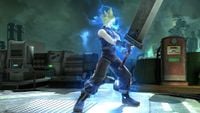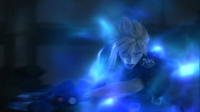Limit (status): Difference between revisions
(→Trivia) |
Unnamed anon (talk | contribs) m (Unnamed anon moved page User:Thegameandwatch/Limit to Limit (status): This draft is ready and well written and the split should have happened 8 years ago) |
(No difference)
| |
Revision as of 14:27, June 11, 2023
Limit is Cloud’s fighter ability in in Super Smash Bros. 4 and Super Smash Bros. Ultimate. It takes the form of a gauge that gradually fills over the course of a game. A full gauge temporarily changes Cloud's stats and some of his moveset while active.
Overview
Cloud posesses a bar known as the Limit Gauge. It appears above his head whenever performing Limit Charge, and is constantly shown above his damage meter in Ultimate. The limit gauge can be filled through several methods, including dealing damage, taking damage, and manually obtaining limit through Limit charge. If Cloud is hit during Limit charge, most of the limit gained is taken away. Regardless of how limit is obtained, Cloud will undergo a "Limit Break" status once the gauge is full, emitting a blue, flame-like aura from his body, accompanied by the sound effect from Final Fantasy VII. If the gauge is fully charged via his down special, Cloud will also announce 「限界を超える」 (localized in Cloud's reveal trailer as "Limits are meant to be broken"). While in Limit Break status, most of his attributes change, with various increases to all his mobility stats. It also allows him a one-time use of a more powerful version of his special moves, fully expending the Limit Gauge once performed. Though Limit Break lasts until Cloud expends the gauge or gets KO'd in Smash 4, it also automatically depletes if gone unused after 15 seconds in Ultimate, much like the FS Meter does, forcing Cloud to behave more aggressively and charge wisely, as he can otherwise lose a valuable KO option or be forced to use his regular, much less effective Climhazzard during a recovery situation.
Charging
Cloud's Limit Gauge follows its own system of units for filling up, with a total of 100 units needed to reach Limit Break status. Dealing damage adds units equal to 0.4× of the amount dealt in Smash 4, and 0.667× in Ultimate, while taking damage adds units equal to the respective amount. As a result, filling up the Limit Gauge only by dealing damage requires a sum of at least 250% in Smash 4, and 150% in Ultimate, while filling it up only by taking damage requires a sum of at least 100% in both games. Dealing damage to shields, with items, equipment effects (such as Speed Crasher and Shield Exploder), or to targets not affiliated to players (such as item or stage hurtboxes) do not count towards filling up the gauge.
Limit Charge, on the other hand, adds a specific amount of units each frame it is active. In Smash 4, this is equal to 0.25 from version 1.1.5 onward, and 0.28 prior to this version, so Limit Charge needs to be active for 400 and 358 frames (6.667 and 5.967 seconds), respectively, to reach Limit Break status without dealing or taking damage. In Ultimate, Limit Charge adds 0.3 units per frame from version 7.0.0 onward, or 0.25 prior to this version, so within the same conditions, it needs to be active for 334 and 400 frames (5.567 and 6.667 seconds), respectively.
In Ultimate, when Cloud gets hit out of Limit Charge (or grabbed alongside any subsequent damage until release), the Limit Gauge loses the amount of units it would have gained instead, so with a gauge close to full, taking slightly below 100% damage is enough to fully empty it. Additionally, once Limit Break status is reached, the Limit Gauge is emptied (therefore removing the status as well) if a special move is not used within 15 seconds; unlike the Final Smash Meter's similar timeout mechanic from version 4.0.0 onward, no visual indication is offered to players of how close the Limit Break status is to being lost.
Move Changes
Limit changes the properties of Cloud's special moves.
Blade Beam after getting Limit is emitted blue and has transcendent priority. When used from the ground, its burst hits multiple times for a total of 19% damage on the first target and 13% on any targets immediately behind the first, then launches all affected.
The Limit Break version of Cross Slash involves Cloud unleashing the entire sequence at high speed, regardless of whether it hits anything or whether the player makes additional inputs. These slashes deal much more damage (27% total) and greater knockback than the base version of the move, with the final hit's hitbox also becoming slightly larger.[1] The camera will also zoom in on the hit fighter if the final hit connects while time slows down for a split second, similar to Little Mac's KO Uppercut. As Limit Cross Slash possesses very fast startup, a large hitbox, surprisingly low ending lag, and deals high shield damage, it is often considered one of Cloud's most effective and all-purpose Limit Break special moves.
The Limit Break version of Climhazzard is overall more effective as a recovery option as it propels Cloud 1.5 times higher than the original height and has significant horizontal maneuverability while rising, while additionally being able to carry Cloud's horizontal momentum as he falls. It will also allow grabbing the ledge while it is in progress. However, Cloud players should be wary of using this variant of the move on stages where the main platform has an underside, as the horizontal component may get them stuck in a fatal position if misused. The initial stab deals 6% and the rising slash deals 7% with increased knockback.
After getting the Limit status, Cloud gets a new move called Finishing Touch which can be inputed when down special input is pressed again after the Limit Gauge is full.
Limit has no effect on Omnislash, and vice versa.
Technical Data
Stat increases
| Stat | Base value | Multiplier | Resulting value |
|---|---|---|---|
| Walk acceleration | 0.1575 0.15 |
1.15× | 0.181125 0.1725 |
| Walk speed | 1.155 1.1 |
1.15× | 1.32825 1.265 |
| Dash speed | 2.145 1.8 |
1.1× | 2.3595 1.98 |
| Run acceleration | 0.11 0.1 |
1.1× | 0.121 0.11 |
| Run speed | 2.167 1.97 |
1.1× | 2.3837 2.167 |
| Traction | 0.106 0.055 |
1.15× | 0.1219 0.06325 |
| Air acceleration | 0.07 | 1.2× | 0.084 |
| Air speed | 1.155 1.1 |
1.2× | 1.386 1.32 |
| Air friction | 0.009 | 1.15× | 0.01035 |
| Gravity | 0.098 | 1.1× | 0.1078 |
| Fall speed | 1.68 | 1.1× | 1.848 |
Origin
The term Limit Break first appeared in Final Fantasy VII and are a key feature of fights in this game and many future entries. Limit is gained over time and large amounts are gained after taking damage. Once the Limit Gauge is filled, the character can use a Limit Break, which, in Cloud's case, is any of his Special Moves in Smash.
Limit Break status is a reference to the blue aura that surrounds Cloud before he uses his Limit Breaks in Advent Children.
Gallery
Trivia
- In Smash 4, the Limit Gauge is not visible in the mirror in Wii Fit Studio.
- In Smash 4, there existed a minor glitch where hitting Cloud the moment his Limit Gauge filled up and he attempted to unleash a Limit Break Special Attack would deplete his Limit Gauge without any attack performed, thus removing the blue aura effect, but would still cause his next attack to be a Limit Break version.







